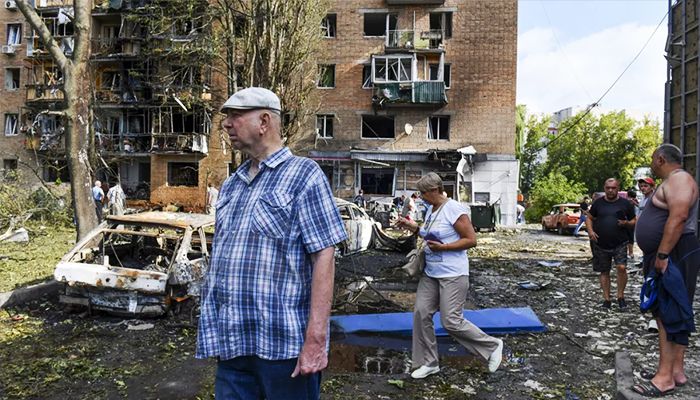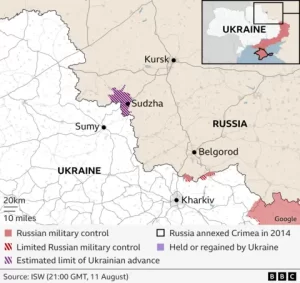Ukraine’s Bold Incursion: 1,000 sq km of Russian Territory Under Control
3 min read
In a significant escalation of the conflict between Ukraine and Russia, Ukraine’s top military commander, Oleksandr Syrskyi, has announced that Ukrainian forces now control approximately 1,000 square kilometers of Russian territory. This development marks one of the most substantial cross-border incursions since the onset of the full-scale war two and a half years ago.
Syrskyi reported that Ukraine’s offensive operation in Russia’s Kursk region continues, a week after it commenced. President Volodymyr Zelensky emphasized that Russia’s aggression, which had previously been directed at other nations, is now returning to its own soil. This strategic move has intensified the conflict, prompting a strong reaction from Russian President Vladimir Putin, who denounced the incursion as a “major provocation” and instructed Russian forces to expel Ukrainian troops from the occupied areas.
In response to the advancing Ukrainian forces, the Russian authorities have initiated large-scale evacuations from the western region of Russia. Approximately 59,000 people have been advised to leave their homes, with the local governor reporting that 28 villages have fallen under Ukrainian control. The governor also mentioned the death of 12 civilians and described the situation as “difficult.”
Ukrainian troops launched their surprise attack last Tuesday, making significant advances of up to 30 kilometers into Russian territory. This bold move has reportedly boosted Ukrainian morale, but it also brings new risks, as some analysts suggest it may provoke more severe retaliatory actions from Russia. A senior British military source expressed concern that Russia might increase its attacks on Ukrainian civilians and infrastructure in response to the incursion.
In a televised address, President Putin accused Ukraine of trying to create discord and undermine Russian unity. He stressed the need for the Russian Defense Ministry to reclaim the occupied territories. The governor of the affected region has reported that 121,000 people have been evacuated, with about 2,000 Russian citizens still in areas under Ukrainian control. He urged residents to take shelter in rooms with solid walls and without windows to protect themselves from missile attacks.
In the adjacent Belgorod region, around 11,000 people have also been urged to evacuate due to increased “enemy activity” near the border. The local governor issued warnings about missile threats and advised residents to seek refuge in basements.
 President Zelensky, in his nightly address, stated that Ukraine’s actions were aimed at forcing Russia to negotiate peace. He reiterated Ukraine’s desire for peace, contrasting it with Russia’s ongoing aggression. Ukrainian officials have disclosed that a significant number of troops are involved in the operation, contradicting initial Russian claims of a smaller incursion. The objective, according to Ukrainian officials, is to inflict substantial losses and destabilize the situation within Russia.
President Zelensky, in his nightly address, stated that Ukraine’s actions were aimed at forcing Russia to negotiate peace. He reiterated Ukraine’s desire for peace, contrasting it with Russia’s ongoing aggression. Ukrainian officials have disclosed that a significant number of troops are involved in the operation, contradicting initial Russian claims of a smaller incursion. The objective, according to Ukrainian officials, is to inflict substantial losses and destabilize the situation within Russia.
Kurt Volker, a former U.S. Ambassador to NATO, suggested that Ukraine’s incursion could have political repercussions for President Putin within Russia. He noted that the attack on Russian territory might lead to increased scrutiny and criticism of Putin’s handling of the war.
During a recent visit to Kyiv, U.S. Senator Lindsey Graham praised the cross-border operation as “brilliant” and “bold,” advocating for the U.S. to supply Ukraine with additional weapons to support its efforts. Meanwhile, some in Russia have expressed alarm over how Ukrainian forces managed to penetrate the Kursk region, with pro-Russian war bloggers highlighting concerns about the breach.
In addition to the conflict developments, the International Atomic Energy Agency (IAEA) reported inspecting a damaged cooling tower at the Russian-controlled Zaporizhzhia nuclear plant in Ukraine following a recent fire. The cause of the fire remains unclear, with conflicting reports from Ukrainian and Russian authorities about the source of the damage.
As the situation continues to evolve, the international community remains vigilant, closely monitoring the impact of Ukraine’s bold incursion and the broader implications for regional stability and security.






